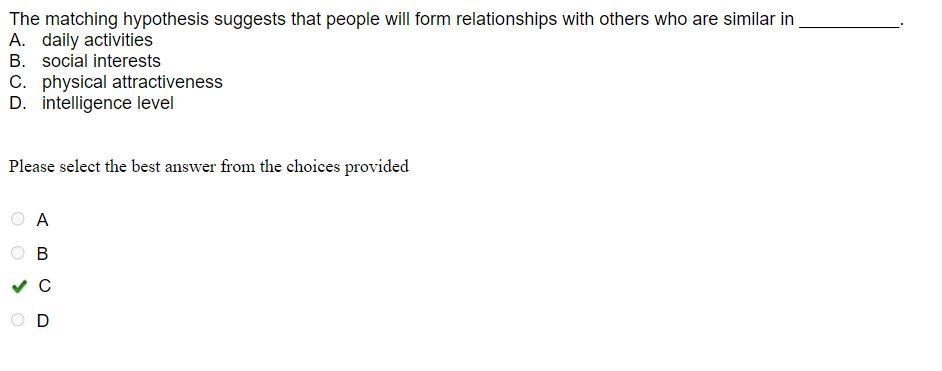The matching hypothesis suggests that people will form relationships with others who are similar in __________. A. daily activities B. social interests C. physical attractiveness D. intelligence level EDGE 2021 Answer (C)

-
Subject:
Social Studies -
Author:
rockettevxov -
Created:
1 year ago
Answers 3
The correct answer is C. Physical attractiveness.
Explanation
The matching hypothesis is a theory about interpersonal relationships that states that people tend to mate with people who are similar in physical attractiveness. This theory argues that before mating, people assess themselves, establish their level of physical attractiveness and establish characteristics for potential partners who share this same level of attraction. So, the correct answer is C. Physical attractiveness.
The complete phrase is "The matching hypothesis suggests that people will form relationships with others who are similar in physical attractiveness"
-
Author:
cottonballruzj
-
Rate an answer:
9
Answer:
c
Explanation:
-
Author:
dean7
-
Rate an answer:
2
AI generated Answer
-
Rate an answer:
0
Do you know an answer? Add it here!
Unable to find an answer to your question?
Don't worry! There are several alternative approaches you can try to resolve your query. Here are some tips to help you find answers in different ways:
- Reframe your question: Sometimes, the way you phrase your question can limit your search results. Try rephrasing it using different keywords or providing more context to get better results.
- Utilize social media: Post your question on social media platforms, particularly those focused on professional or specialized topics. Twitter, LinkedIn, and Facebook groups can connect you with individuals who may have relevant expertise or experiences to share.
- Consult subject matter experts: Reach out to experts in the field related to your question. Many professionals are willing to help and share their knowledge. You can connect with them through email, LinkedIn messages, or by attending relevant conferences or events.
- Use our website to find your question through the search box above, or you can sign up to ask your question for our big educational community. Our experts will review your question, and you will get a quick and quality answer.
- Collaborate with others: If your question is related to a specific project or problem, consider collaborating with others who might have complementary skills or knowledge. Teamwork can lead to innovative solutions and shared insights.
Remember, the process of finding answers often involves persistence, creativity, and an open mind. By exploring various resources, reaching out to others, and being proactive in your search, you increase your chances of finding the information you need. Happy quest for knowledge!
